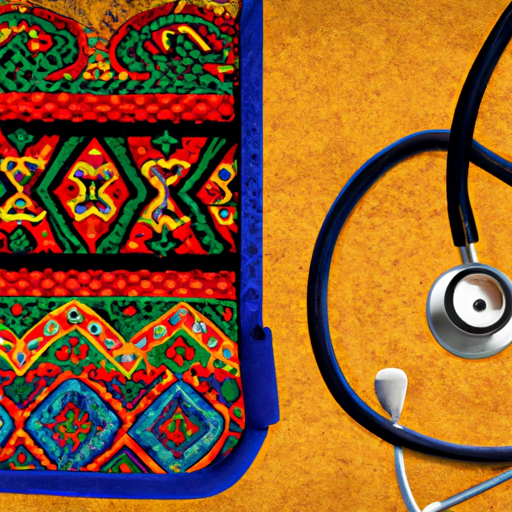When it comes to medical tourism, India shines as a sought-after destination for individuals seeking world-class healthcare and wellness experiences. With top-notch treatments and an opportunity to immerse oneself in the vibrant tapestry of Indian culture, it’s no wonder that this industry is thriving. As the popularity of medical tourism continues to rise, it becomes vital to address the ethical considerations and ensure that patient rights are upheld. In this article, we will explore the importance of medical tourism ethics and how India is taking steps to ensure the welfare and rights of patients seeking treatment in the country.

The Growth of Medical Tourism in India
India has emerged as a leading destination for medical tourism in recent years, offering high-quality healthcare services at affordable prices. The medical tourism industry in India has experienced tremendous growth due to various factors. Let’s take a closer look at the reasons behind its popularity and explore the statistics that illustrate this growth.
Overview of the Medical Tourism Industry
Medical tourism refers to traveling to another country for medical treatment, often combined with a vacation experience. India has positioned itself as a hub for medical tourism, attracting patients from around the world seeking advanced medical procedures, top-notch facilities, skilled healthcare professionals, and cost-effective treatments.
With a diverse range of medical services, including cardiology, orthopedics, organ transplants, dentistry, cosmetic surgery, and alternative treatments like Ayurveda and yoga, India offers a comprehensive approach to healthcare for international patients. The country’s renowned medical institutions and state-of-the-art infrastructure have established its credibility as a global healthcare destination.
Reasons for the Popularity of Medical Tourism in India
There are several reasons why India has become a popular choice for medical tourists. Firstly, the cost of medical treatments in India is significantly lower compared to many developed countries. This cost advantage, coupled with high-quality healthcare, makes it an attractive option for patients seeking affordable yet reliable medical procedures.
Secondly, India is home to highly skilled and experienced medical professionals who have received education and training from top institutes worldwide. This expertise, combined with the availability of advanced technology and medical equipment, ensures that patients receive world-class healthcare services.
Furthermore, the cultural diversity, warm hospitality, and historical attractions make India an appealing destination for medical tourists. Patients not only get access to quality treatment but also have the opportunity to immerse themselves in the vibrant culture and explore the country’s renowned tourist spots.
Statistics on the Growth of Medical Tourism in India
The growth of medical tourism in India can be quantified by looking at the statistics. According to a report by the Confederation of Indian Industry (CII) and McKinsey, India’s medical tourism industry is projected to reach a valuation of $9 billion by 2020, with an annual growth rate of 20-30%.
In 2019 alone, India witnessed over 500,000 medical tourists visiting the country for various treatments. These numbers reflect the increasing trust and confidence that international patients have in the Indian healthcare system.
The most sought-after medical procedures in India include cardiac surgeries, orthopedic treatments, infertility treatments, and cosmetic surgeries. Patients from the United States, the United Kingdom, Africa, and the Middle East constitute a significant portion of medical tourists visiting India.
The growth rate of medical tourism in India highlights the country’s ability to cater to the healthcare needs of patients from diverse backgrounds while maintaining affordability and quality standards.
Understanding Patient Rights
As the medical tourism industry expands, ensuring patient rights becomes crucial. Patients traveling to a foreign country for medical treatment need to be aware of their rights in order to receive ethical and compassionate care. Let’s delve into the definition and importance of patient rights and explore the international frameworks that protect these rights.
Definition and Importance of Patient Rights
Patient rights refer to the fundamental rights every individual has when seeking medical care. These rights include the right to dignity, confidentiality, informed consent, privacy, and safety. Recognizing and respecting these rights is essential to upholding the principles of ethical healthcare.
Ensuring patient rights is vital in the medical tourism industry to build trust, foster positive patient experiences, and maintain the reputation of healthcare providers and the destination country. Every patient, regardless of their nationality or background, should have their rights protected to receive equitable and compassionate care.
Overview of International Patient Rights Frameworks
Several international organizations have formulated frameworks and guidelines to protect and promote patient rights. The World Health Organization (WHO) has outlined a set of patient rights that emphasize the right to access healthcare, information, and participation in decision-making.
In addition to the WHO, the United Nations has recognized patient rights as a crucial aspect of healthcare and has highlighted the need to protect these rights through various resolutions and declarations. Other organizations such as the International Society for Quality in Health Care (ISQua) and the Joint Commission International (JCI) have also established standards and accreditation programs to ensure patient safety and rights.
These international frameworks serve as a guide for healthcare providers, policymakers, and patients in understanding and implementing patient rights.
Challenges in Ensuring Patient Rights in the Medical Tourism Industry
While patient rights are universally recognized, implementing and safeguarding these rights in the context of medical tourism presents unique challenges. Language barriers, cultural differences, and differing legal systems can pose obstacles in providing comprehensive patient care.
Moreover, the lack of standardized regulations and oversight in some medical tourism destinations can compromise patient rights. It is essential for healthcare providers, facilitators, and regulatory bodies to address these challenges to create a safe and ethical environment for medical tourists.

Ethical Considerations in Medical Tourism
As medical tourism continues to flourish, it is crucial to address the ethical considerations that arise in this industry. Preserving patient rights and ensuring ethical practices are vital for maintaining the integrity of medical tourism. Let’s explore some of the key ethical considerations in medical tourism.
Informed Consent and Transparency
Informed consent is a fundamental ethical principle in healthcare, ensuring that patients are fully aware of the risks, benefits, alternatives, and potential outcomes of a medical procedure before providing their consent. In the context of medical tourism, ensuring that patients have access to comprehensive and accurate information about their treatment options is essential.
Transparency in pricing, medical outcomes, and potential complications is also crucial to maintaining ethical standards in medical tourism. Healthcare providers and facilitators should provide clear and honest information to patients, enabling them to make informed decisions regarding their healthcare.
Quality and Safety Standards in Medical Facilities
Patients traveling for medical treatment expect to receive care of the same quality and safety standards as they would in their home country. It is the responsibility of medical facilities to adhere to internationally recognized standards and protocols to ensure patient safety.
Accreditation from reputable international bodies such as JCI or National Accreditation Board for Hospitals and Healthcare Providers (NABH) helps maintain quality standards and builds trust among patients. Healthcare providers should focus on continuous improvement, patient feedback, and robust safety measures to avoid compromising patient well-being.
Protection Against Exploitation and Medical Negligence
Medical tourism can expose patients to risks of exploitation and medical negligence, especially in countries without adequate regulations and oversight. Patients should be protected against such unethical practices, and healthcare providers must prioritize patient care over financial gain.
Regulatory bodies should establish mechanisms to monitor and investigate complaints against healthcare providers to ensure accountability and prevent any form of exploitation or negligence.
Privacy and Confidentiality of Patient Information
Respecting patient privacy and maintaining confidentiality of medical information are crucial ethical considerations. Patients must have confidence that their personal and medical details will be kept confidential throughout their treatment journey.
Healthcare facilities and facilitators should implement robust data protection measures, including secure storage, access controls, and adherence to applicable privacy laws, to safeguard patient information.
Ensuring ethical considerations in medical tourism is a collective responsibility of healthcare providers, regulatory bodies, and facilitators to prioritize patient welfare and maintain the integrity of the industry.
Regulation and Accreditation
To ensure the ethical practice of medical tourism, robust regulation and accreditation mechanisms are necessary. Governments play a crucial role in establishing regulations and policies that hold healthcare providers accountable and protect the rights of medical tourists. Let’s explore the significance of regulations and the role of accreditation agencies in the medical tourism industry.
Government Regulations and Policies
Government regulations and policies provide a framework for ethical and transparent medical tourism practices. These regulations often cover areas such as licensing requirements, quality standards, patient rights, and dispute resolution mechanisms.
By implementing and enforcing these regulations, governments can create a safe and reliable environment for medical tourists. Close collaboration between the government, healthcare providers, and other stakeholders is essential in designing and implementing effective regulations.
Accreditation Agencies and Their Role
Accreditation agencies play a vital role in assessing and certifying the quality and safety standards of healthcare facilities. These agencies evaluate the compliance of medical facilities with established protocols, guidelines, and international standards.
Accreditation agencies like JCI, NABH, and International Organization for Standardization (ISO) validate the quality of healthcare services provided by medical facilities. Accreditation helps build trust among medical tourists, ensuring that they receive care from reliable and reputable healthcare providers.
Importance of Certification for Medical Facilities
Certification from recognized accreditation agencies is essential for medical facilities in the medical tourism industry. Certification ensures that the facility meets internationally accepted standards for patient care, safety, and infection control.
Medical tourists should look for certified facilities to ensure they receive reliable and ethical care. Certification serves as a benchmark that validates the quality and commitment of the healthcare provider towards patient well-being.

Legal Rights of Medical Tourists
Protecting the legal rights of medical tourists is essential to ensure accountability and provide recourse in case of any adverse events or malpractice. Understanding the legal framework and contracts involved in medical tourism is crucial for patients. Here, we will discuss the rights to legal recourse, medical malpractice laws in India, the role of contracts, and the importance of travel insurance.
Rights to Legal Recourse and Compensation
Medical tourists have the right to seek legal recourse and compensation in case of medical negligence or malpractice. However, accessing legal remedies can be challenging, especially for patients from different jurisdictions.
Although the laws regarding medical malpractice and compensation vary from country to country, it is important for medical tourists to understand their rights and seek legal advice if necessary. Governments and regulatory bodies should establish channels for medical tourists to seek redressal and ensure proper implementation of legal frameworks.
Understanding Medical Malpractice Laws in India
In India, medical malpractice laws protect the rights of patients and provide a framework for seeking legal remedies. The Medical Council of India (MCI) has laid down ethical guidelines for healthcare professionals and has disciplinary powers in case of professional misconduct.
Additionally, Indian courts have recognized the principle of ‘strict liability’ for medical malpractice cases, which holds healthcare providers accountable for any harm caused to patients due to negligence. Patients can approach consumer courts or civil courts to seek compensation for medical negligence.
Understanding the legal landscape and potential remedies available is essential for medical tourists to protect their rights in case of any medical malpractice.
The Role of Medical Tourism Contracts
Medical tourism contracts between patients, healthcare providers, and facilitators outline the terms and conditions of the medical journey. These contracts are crucial in ensuring transparency, providing clarity on costs, treatment plans, and expectations.
Patients should carefully review and understand the terms of the contract, including cancellation policies, insurance coverage, and liabilities. It is advisable to seek legal advice before signing any contracts to ensure clarity and protection of rights.
Importance of Travel Insurance
Travel insurance is an integral part of medical tourism, offering financial protection and support in case of emergencies or unexpected events during the medical journey. Travel insurance should provide coverage for medical complications, treatment costs, evacuation, and repatriation.
Medical tourists should carefully select a comprehensive travel insurance policy that meets their specific requirements. It is essential to read the policy documents thoroughly, understand the coverage limits, and disclose any pre-existing medical conditions to avoid any disputes or complications.
By being aware of their legal rights, understanding the legal framework, and securing the necessary insurance coverage, medical tourists can protect themselves and ensure a hassle-free medical journey.
Ethical Challenges Faced by Medical Professionals
Medical professionals practicing in the medical tourism industry face several ethical challenges unique to this industry. Ensuring a high standard of care, addressing conflicts of interest, ethical advertising and promotion, and overcoming language and cultural barriers are some of the key challenges faced by medical professionals. Let’s explore these ethical considerations in detail.
Duty of Care and Conflict of Interest
Healthcare professionals have a duty of care towards their patients, which entails putting patient welfare above any personal gain or financial interest. However, in the medical tourism industry, conflicts of interest can arise due to the involvement of various stakeholders.
It is crucial for medical professionals to recognize potential conflicts of interest and prioritize patient care. Ethical guidelines and professional codes of conduct should be followed to ensure that patient well-being is always the primary concern.
Ensuring Ethical Advertising and Promotion
Medical professionals and healthcare facilities must adhere to ethical standards when advertising their services and promoting medical tourism. Accurate and transparent information regarding treatment options, associated risks, success rates, and qualifications of medical professionals should be provided to patients.
It is important to avoid any misleading or exaggerated claims that may exploit vulnerable patients seeking medical treatment. The emphasis should be on providing credible information and facilitating informed decision-making.
Addressing Language and Cultural Barriers
Medical tourism involves patients from different cultural backgrounds and languages. Communicating effectively and addressing language and cultural barriers is crucial to providing ethical and patient-centered care. Medical professionals should ensure that patients have access to interpretation services and receive information in their preferred language.
Understanding cultural differences, beliefs, and value systems helps medical professionals provide culturally sensitive care and avoid any ethical dilemmas that may arise due to differing perspectives on healthcare.
Safeguarding the Well-being of Vulnerable Patients
Medical tourism often involves vulnerable patient populations, such as individuals seeking fertility treatments, cosmetic surgeries, or experimental procedures. It is imperative for medical professionals to prioritize patient safety and well-being, especially when dealing with these vulnerable groups.
Medical professionals should provide realistic expectations, ensure patient understanding of potential risks, and obtain informed consent. Additionally, they should actively monitor patient progress and provide necessary support and follow-up care to minimize the potential for exploitation or harm.
By addressing these ethical challenges, medical professionals can uphold the highest standards of care and enhance the overall patient experience in medical tourism.
Roles and Responsibilities of Medical Tourism Facilitators
Medical tourism facilitators play a crucial role in assisting patients throughout their medical journey. From organizing travel logistics to coordinating treatment plans, facilitators ensure a smooth and seamless experience for medical tourists. Let’s explore the definition and functions of medical tourism facilitators and delve into the ethical considerations in facilitator-patient relationships.
Definition and Functions of Medical Tourism Facilitators
Medical tourism facilitators act as intermediaries between patients and healthcare providers, assisting patients in navigating the complex process of seeking medical treatment abroad. Their functions include providing information about treatment options, coordinating travel arrangements, arranging appointments with healthcare professionals, and providing post-treatment support.
Facilitators serve as a bridge between patients and healthcare providers, offering personalized assistance and ensuring a patient-centered approach throughout the medical journey.
Importance of Transparency and Accountability
Transparency and accountability are essential ethical considerations for medical tourism facilitators. Facilitators should provide accurate and unbiased information to patients, including treatment costs, potential risks, and outcomes. Patients must have a clear understanding of what to expect during their medical journey.
Accountability comes into play when addressing complaints or resolving conflicts. Facilitators should have a robust mechanism to handle grievances and ensure that patient concerns are addressed promptly and effectively.
Ensuring Patient-Centered Care and Support
Medical tourism facilitators should prioritize patient well-being and advocate for patient interests throughout the treatment process. They should be proactive in addressing patient concerns, providing emotional support, and acting as a point of contact between patients and healthcare providers.
Facilitators should strive to establish a relationship of trust and transparency with patients, advocating for their rights and ensuring that their needs are met. Patient satisfaction should be the ultimate goal, and facilitators should continuously seek feedback to improve their services.
Ethical Considerations in Facilitator-Patient Relationships
Facilitator-patient relationships should be based on trust, mutual respect, and open communication. Facilitators should avoid conflicts of interest and prioritize patient welfare. They should disclose any financial arrangements or incentives with healthcare providers and should not engage in practices that compromise the patient’s best interests.
Facilitators should provide unbiased information and allow patients to make informed decisions regarding their treatment options. Patients should be encouraged to seek independent medical advice and not be influenced solely by the facilitator’s recommendations.
By upholding ethical standards and maintaining patient-centered care, medical tourism facilitators can contribute to the overall success and integrity of the medical tourism industry.
Case Studies: Ethical Issues and Solutions
Examining real-life case studies can provide valuable insights into the ethical issues faced in medical tourism and the corresponding solutions. Let’s explore three case studies highlighting different ethical considerations and the measures taken to address them.
Case Study 1: Informed Consent and Transparency
A patient from the United States traveled to India for cosmetic surgery. The patient’s consent form did not accurately reflect the risks and potential complications associated with the procedure. The patient was not adequately informed, leading to unexpected complications post-surgery.
To address this issue, the healthcare facility revised its informed consent process, ensuring that patients received detailed explanations about risks, benefits, and alternatives. The facility also implemented a comprehensive patient education program to enhance transparency and allow patients to make well-informed decisions.
Case Study 2: Exploitation and Medical Negligence
A patient from the Middle East sought infertility treatment in India. The patient was promised a high success rate without disclosing the potential limitations of the treatment. During the course of treatment, the patient faced multiple complications due to negligence.
To prevent such exploitation, the government introduced stricter regulations to monitor and oversee assisted reproductive technology (ART) centers. This included mandatory counseling sessions, disclosure of success rates, and clear communication of the risks involved. These measures aimed to protect patients from unethical practices and ensure their well-being.
Case Study 3: Privacy and Confidentiality Violations
A patient from the United Kingdom underwent a major medical procedure in India. His medical records were inadvertently shared with a third party without his consent, violating his privacy and compromising the confidentiality of his personal information.
To prevent such breaches, healthcare facilities in India have implemented strict data protection measures, including secure electronic health records systems, access controls, and staff training on the importance of patient confidentiality. These measures aim to safeguard patient information and maintain trust between patients and healthcare providers.
Recommendations for Ensuring Patient Rights
To strengthen patient rights and address the ethical considerations in the medical tourism industry, several recommendations can be implemented. Let’s explore some key recommendations that aim to enhance patient well-being and protect their rights.
Strengthening Regulations and Enforcement
Governments should establish and enforce robust regulations that govern the medical tourism industry. These regulations should address patient rights, transparency in pricing, quality standards, and redressal mechanisms. Regular audits and inspections of healthcare facilities can ensure compliance and accountability.
Promoting Ethical Practices Through Education and Awareness
Education and awareness among patients, healthcare professionals, and facilitators are essential to promote ethical practices in the medical tourism industry. Training programs should be conducted to enhance cultural competency, ethical decision-making, and communication skills. Patients should be empowered with knowledge about their rights and responsibilities, allowing them to make informed decisions.
Enhancing Transparency and Informed Decision-Making
Transparency in pricing, treatment outcomes, risks, and benefits should be a priority for healthcare providers and facilitators. Providing accurate and unbiased information to patients enables them to make well-informed decisions about their healthcare. Clear communication channels should be established to address patient queries and concerns.
Establishing a Patient Complaints and Grievance Redressal System
A well-defined and accessible complaints and grievance redressal system is essential to address any issues or disputes. Governments, regulatory bodies, and healthcare facilities should collaborate to establish a transparent and efficient system that allows patients to voice their concerns and resolve disputes in a timely manner.
By implementing these recommendations, the medical tourism industry can ensure patient rights, create a more transparent and ethical environment, and maintain the integrity of the industry.
Conclusion
The growth of medical tourism in India has opened up new opportunities for patients seeking quality healthcare at affordable prices. However, ensuring patient rights and ethical practices is crucial to maintaining patient trust and the reputation of the industry. By understanding patient rights, addressing ethical challenges, implementing robust regulation and accreditation mechanisms, protecting legal rights, and upholding the responsibilities of all stakeholders involved, the medical tourism industry in India can continue to thrive ethically and compassionately.
